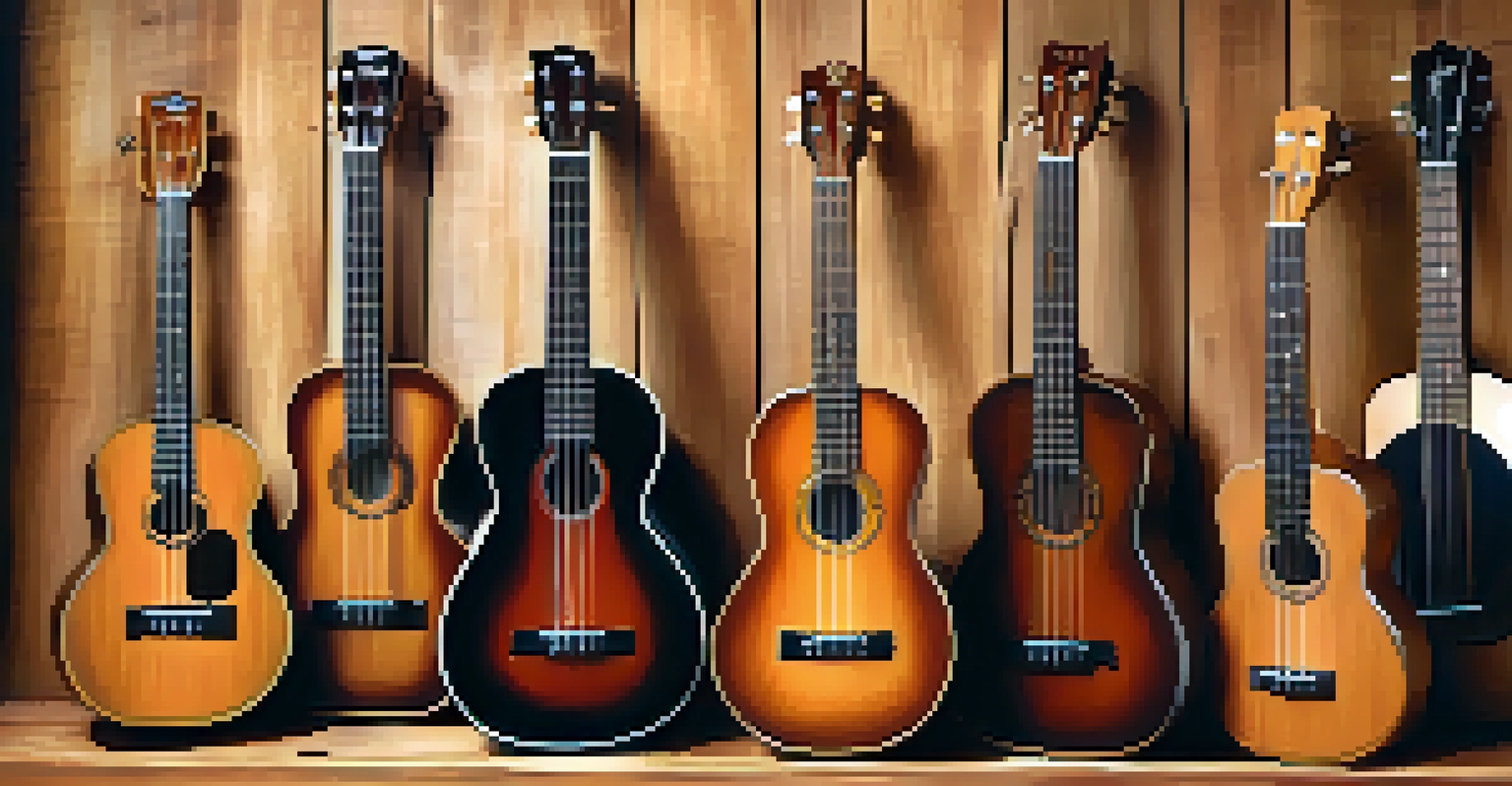Ukulele Sound: How Material Choices Impact Tone

Understanding Ukulele Tone: The Basics
The tone of a ukulele is shaped by various factors, primarily the materials used in its construction. Each component, from the body to the strings, contributes to the overall sound. Understanding these elements can help players make informed choices when selecting an instrument.
The ukulele is a small instrument with a big heart, and the sound it produces is a reflection of the materials and care that goes into its creation.
At its core, the tone refers to the quality of sound produced by the ukulele. It encompasses aspects like warmth, brightness, and resonance, which can vary significantly depending on the materials. Just like cooking, where ingredients alter the dish, the materials in a ukulele influence its final sound.
Related Resource
For instance, a solid wood body tends to produce a richer, warmer sound than a laminate body. This is because solid wood resonates better and amplifies sound waves more effectively, leading to a more vibrant tone. So, whether you're strumming a classic tune or a modern hit, the choice of material plays a vital role.
The Role of Tonewoods: Why They Matter
Tonewoods are the primary materials used in crafting the body of a ukulele, and they have a significant impact on the instrument's sound. Common tonewoods include mahogany, koa, and spruce, each offering distinct tonal qualities. Mahogany, for example, is known for its warm, mellow sound, making it a popular choice for many ukulele players.

Koa, on the other hand, is native to Hawaii and is prized for its beautiful aesthetic and bright, articulate tone. Many musicians favor koa for its ability to produce a well-rounded sound that projects beautifully. Understanding the characteristics of these tonewoods can help players choose a ukulele that aligns with their musical style.
Materials Shape Ukulele Tone
The choice of materials, including tonewoods and strings, significantly affects the overall sound quality of a ukulele.
Lastly, spruce is often used for its bright, clear sound, which makes it ideal for players who prefer a more pronounced treble. The type of wood you choose can ultimately enhance your playing experience, allowing you to express yourself more fully through your music.
Body Shape and Size: Impact on Sound
The shape and size of a ukulele's body also play a crucial role in determining its tone. Larger bodies typically produce deeper, fuller sounds, while smaller bodies offer a more focused, bright tone. For example, a tenor ukulele, being larger, tends to have a richer sound compared to a soprano ukulele, which is more compact and brighter.
Music is the shorthand of emotion, and the ukulele can express a wide range of feelings, depending on its tone and construction.
Different shapes, such as the concert and baritone ukuleles, further influence the sound. The concert ukulele strikes a balance between size and tone, offering a sound that is both warm and bright. This versatility makes it a favorite among many players looking for a well-rounded instrument.
Related Resource
When selecting a ukulele, consider how the body shape aligns with your musical goals. Whether you’re strumming chords or fingerpicking melodies, the right body size can enhance your playing and the sound you wish to create.
Strings Matter: Material and Gauge Choices
While the body of the ukulele significantly impacts its tone, the strings also play a pivotal role. Ukulele strings come in various materials, including nylon, fluorocarbon, and gut, each contributing distinct tonal characteristics. For instance, nylon strings provide a warm, mellow sound, while fluorocarbon strings offer brightness and clarity.
The gauge, or thickness, of the strings can also affect the sound. Thicker strings usually produce a louder, fuller sound, while thinner strings tend to be brighter and more articulate. Musicians often experiment with different string materials and gauges to find the combination that best suits their playing style.
Body Size Influences Sound Quality
The shape and size of a ukulele's body play crucial roles in determining its tonal characteristics, with larger bodies producing deeper sounds.
Choosing the right strings is like selecting the perfect spice for a dish; they can elevate your sound and enhance your overall playing experience. So, don’t hesitate to try different options until you find the ideal fit for your ukulele.
Finishing Touches: How Finishes Affect Tone
The finish applied to a ukulele can also influence its sound. Common finishes include lacquer, oil, and polyurethane, and each has its unique effects on tone and resonance. For example, a thin finish allows the wood to vibrate more freely, resulting in a more resonant sound, while a thicker finish may dampen those vibrations.
Many players prefer natural oil finishes, which enhance the wood's natural beauty while allowing it to breathe. This type of finish can lead to a warm, open tone that evolves over time as the wood matures. On the other hand, lacquer finishes can provide a bright, polished look but may slightly restrict the wood's natural resonance.
Related Resource
Ultimately, the choice of finish is a personal preference, but it's essential to consider how it will affect the sound. Just like choosing the right outfit for an occasion, the finish you select can enhance your ukulele's overall aesthetic and tonal qualities.
Environmental Factors: Humidity and Temperature
Environmental conditions can significantly impact a ukulele's tone over time. Factors such as humidity and temperature can cause the wood to expand or contract, affecting its resonance and sound quality. For example, high humidity can lead to a warmer sound, while dry conditions might make the tone brighter and sharper.
It's essential for ukulele players to be mindful of their instrument's environment. Keeping your ukulele in a stable climate can prevent damage and preserve its tonal qualities. Using a humidifier or a case with climate control features can help maintain optimal conditions for your instrument.
Environmental Care Matters
Maintaining stable humidity and temperature is essential for preserving a ukulele's tonal qualities over time.
In essence, caring for your ukulele is like tending to a garden; it requires attention and nurturing to flourish. By being aware of how environmental factors influence tone, you can ensure your ukulele remains in top condition for years to come.
Choosing the Right Ukulele for Your Sound
With all these factors in mind, how do you choose the right ukulele for your desired sound? Start by considering the style of music you want to play and the specific tonal qualities you're looking for. If you prefer a warm, mellow tone, a mahogany body with nylon strings might be your best bet.
It's also crucial to test different ukuleles in person, if possible. Each instrument has its unique character, and playing them can help you find one that resonates with you. Don't hesitate to ask questions and seek advice from knowledgeable staff at music stores or fellow musicians.

Ultimately, the best ukulele for you is one that feels comfortable and inspires you to play. With the right material choices and a little exploration, you'll be well on your way to finding the perfect ukulele that complements your musical journey.